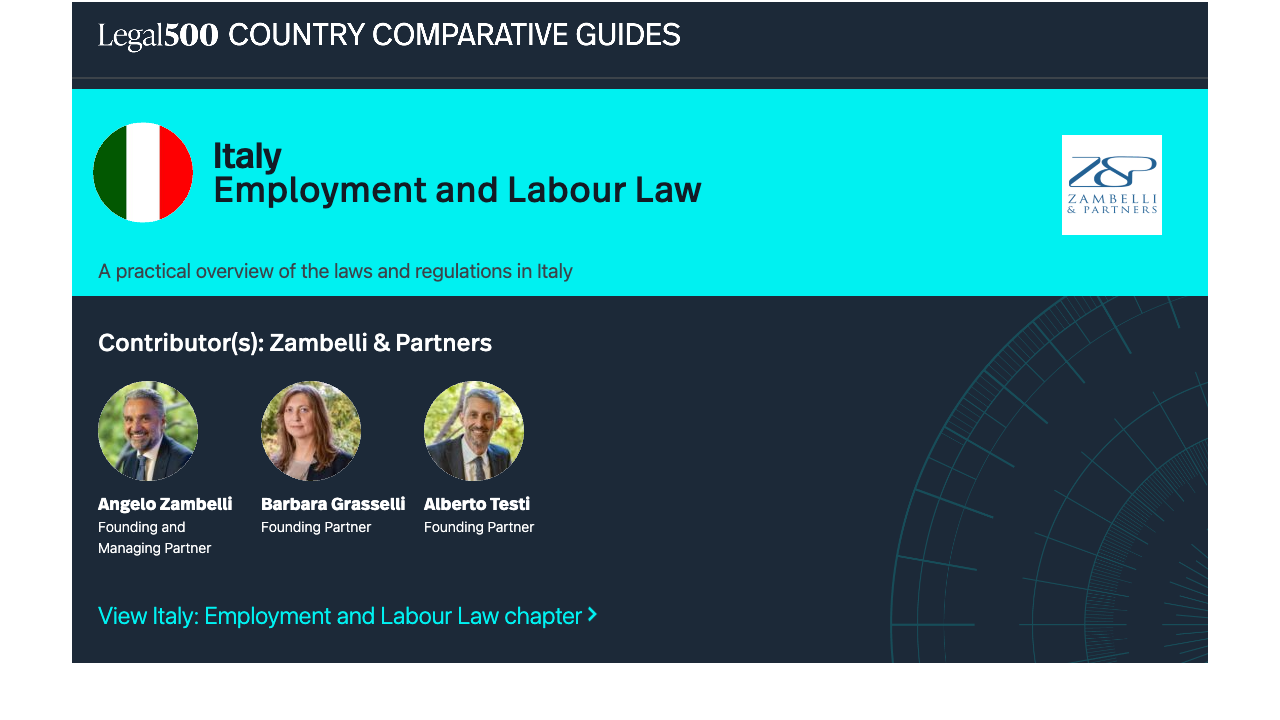The Italian Chapter is edited by Angelo Zambelli, Barbara Grasselli and Alberto Testi
The country-specific Q&A is available on legal500.com and provides an overview of Employment and Labour laws and regulations applicable in Italy.
Below is an extract, click here to read the Q&A on legal500.com.
-
Does an employer need a reason to lawfully terminate an employment relationship? If so, state what reasons are lawful in your jurisdiction?
Over the trial period, any employment relationships may be legitimately terminated by the employer even if neither a “cause” for termination nor other specific reasons allowing employees’ dismissal occur.
Once the trial period ends, employment contracts executed with employees holding the qualification of middle-manager (“quadro”), white-collar or blue-collar may be lawfully terminated by the employer only where any out of the reasons detailed below occurs:
– a cause for termination (“giusta causa”), this being a breach by the employee whose seriousness prevents the continuation, even on a temporary basis, of the employment relationship (for example, the theft of the employer’s goods);
– subjective justified grounds (“giustificato motivo soggettivo”), these being a less serious breach by the employee (for example, unjustified absences from work);
– objective justified grounds (“giustificato motivo oggettivo”), which qualify as those reasons relating to the production, the work organization or its regular operation (namely, individual redundancies).
Employment contracts executed with executive status employees (“dirigenti”) are governed by specific rules set forth by the national collective bargaining agreements applicable to such category of employees, which generally provide for that their dismissal must be “justified” (according to case-law precedents hereof, the dismissal of an executive is “justified” whenever it relies on reasons other than false, arbitrary, discriminatory or unfounded grounds).
-
What, if any, additional considerations apply if large numbers of dismissals (redundancies) are planned? How many employees need to be affected for the additional considerations to apply?
A specific procedure (the “collective dismissal procedure”) within which the employer is charged with information and consultation obligations towards the external trade unions/internal works councils has to be triggered in advance whenever an employer staffed with more than 15 employees intends to dismiss – due to reduction, transformation or shutdown of activities -, within a 120-day term, at least 5 employees employed at the same production unit or at different production units within the same province.
For details about such procedure, please refer to question no. 7 below.
-
What, if any, additional considerations apply if a worker’s employment is terminated in the context of a business sale?
Under Italian law, dismissals relying on a transfer of a business (or a part hereof) having taken place do qualify as being null and void.
In such a case, the relevant employees are entitled to have their employment relationship continuing with the transferee (or, at their own choice, to the payment of an indemnity in lieu of reinstatement amounting to 15 months of total compensation) as well as to be paid an indemnity amounting to those salaries which would have been accrued over the period as from the dismissal date until the date of actual reinstatement (a minimum floor amounting to 5 months of overall compensation is provided for). However, this does not prevent the transferor (until the transfer date) and the transferee (once the transfer takes place) from dismissing employees according to the general rules governing such matter, whereby the employer is allowed to legitimately terminate the employment relationship whenever a cause for termination (“giusta causa”) or justified grounds, either subjective or objective (“giustificato motivo soggettivo o oggettivo”), occurs/occur.
-
What, if any, is the minimum notice period to terminate employment? Are there any categories of employee who typically have a contractual notice entitlement in excess of the minimum period?
Employees are entitled to the notice period only in the event that the dismissal:
– is served within a collective dismissal procedure;
– relies on justified grounds, either subjective or objective (“giustificato motivo soggettivo o oggettivo”);
– is grounded upon their absences from work due to illness or accident having exceeded the relevant maximum threshold set forth by the applicable national collective bargaining agreement;
– relies on their supervening professional unsuitability.
The actual term of the notice period is set out by the applicable national collective bargaining agreement and depends on the qualification (executive/“dirigente”, middle-manager (“quadro”), white-collar or blue-collar) assigned to the relevant employee and his/her length of service.
Generally speaking, based on the most common national collective bargaining agreements, the term of the notice is in the range between 15 days and 6 months.
Individual agreements whereby the notice period in case of dismissal not for cause as per the applicable national collective bargaining agreement is increased may be legitimately executed; such kind of agreement are rather common in the practice in case of top managers.



